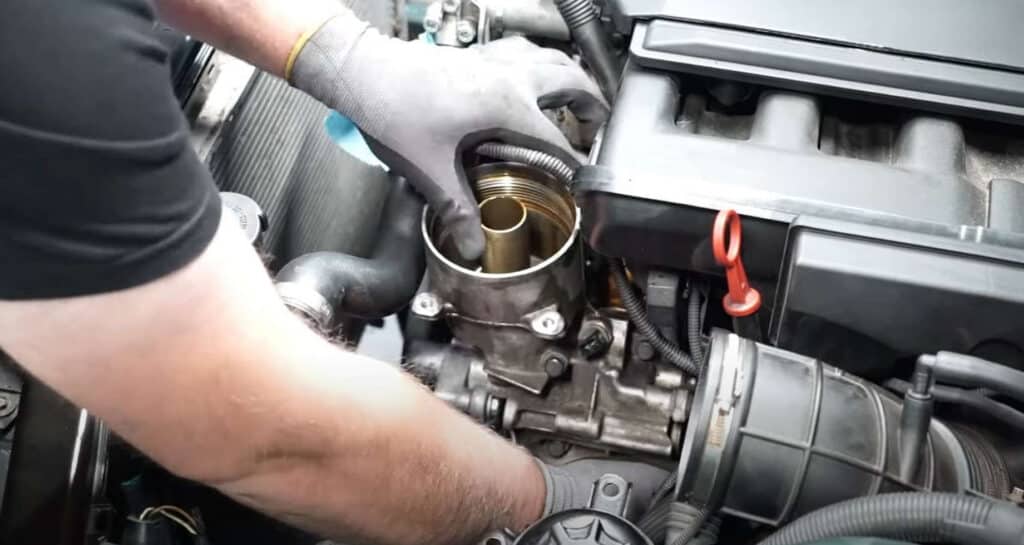Introduction
Ever noticed a mysterious puddle of oil under your car? The culprit might be closer to home than you think.
What is an Oil Filter Housing Seal and its Function?
The oil filter housing seal, as its name suggests, is responsible for ensuring a tight and leak-free seal between the oil filter and the engine. This often-overlooked component plays a vital role in maintaining the purity and pressure of the engine oil, thereby ensuring the smooth operation of your vehicle’s engine.
How Much Will it Cost to Replace an Oil Filter Housing Seal in Canada?
Replacing an oil filter housing seal in Canada can cost anywhere from $200 to $400. The cost of the part itself is relatively minimal, typically ranging between $20 and $50. The majority of the cost comes from labour, which can range from $180 to $350, depending on the complexity of the vehicle’s design. The entire process can take anywhere from 2 to 4 hours to complete.

What are the Symptoms of a Faulty Oil Filter Housing Seal?
• Oil Leaks: You may notice oil puddles or spots under your car, a sure sign that oil is leaking from somewhere, possibly from a faulty oil filter housing seal.
• Low Oil Level: If you’re frequently needing to top off your engine oil, it may be due to a leaking oil filter housing seal.
• Illuminated Oil Warning Light: If the oil pressure gets too low due to a leak, your car’s oil warning light may illuminate.
• Overheating Engine: An oil leak can lead to inadequate lubrication and cooling of the engine, potentially causing overheating.
• Unusual Noises: If the engine isn’t adequately lubricated due to low oil levels, you may hear knocking or ticking noises from the engine.
• Burning Oil Smell: If the leaking oil comes into contact with hot parts of the engine or exhaust, you may notice a burning oil smell.
How Long Does an Oil Filter Housing Seal Last?
The longevity of an oil filter housing seal can vary greatly, but typically, you can expect it to last between 60,000 to 90,000 kilometers. Factors such as the quality of the seal, driving conditions, and regular maintenance can influence its lifespan.
How Does an Oil Filter Housing Seal Become Defective?
An oil filter housing seal can become defective due to several reasons:
• Aging and Wear: Over time, the seal can harden, become brittle, and start to crack, creating potential leak points.
• Heat Exposure: The engine bay experiences high temperatures, which can cause the seal to warp or degrade over time.
• Poor Quality Materials: If the seal is made from subpar materials, it can fail more quickly under normal driving conditions.
• Incorrect Installation: If the seal is not installed correctly during an oil change or engine repair, it can be damaged or may not function properly.
• Contamination: Oil or other engine grime can cause the seal to degrade over time, leading to potential leaks.
How Can a Faulty Oil Filter Housing Seal Affect Engine Performance?
• A faulty oil filter housing seal can lead to oil leaks, causing a decrease in engine oil levels. This reduction in oil can result in insufficient lubrication of engine components, increasing wear and tear, and potentially causing engine damage.
• The decreased lubrication can lead to higher engine temperatures, as oil acts as a coolant, helping to disperse heat. Overheating can lead to reduced engine performance and even engine failure.
• Reduced oil pressure, due to a leaky seal, can affect the oil’s flow to critical engine components. This can lead to poor engine performance and potential damage.
• A faulty seal can allow contaminants to enter the oil filter and circulate within the engine, leading to increased wear and potentially impacting engine performance.
• An oil leak might trigger the check engine light or low oil pressure light, indicating potential engine problems that could affect performance.

Is it Safe to Drive with a Faulty Oil Filter Housing Seal?
Choosing to drive with a faulty oil filter housing seal is like setting a timer on a ticking time bomb – you’re not sure when, but something will eventually go wrong. The issue starts with oil leaks, which might seem harmless at first, a few droplets here and there. However, these minute leaks can lead to a significant reduction in the engine oil level over time. This lowered oil level means less lubrication for your engine parts. Consequently, these parts begin to wear out faster, leading to poor engine performance and potential engine failure.
Furthermore, there’s a secondary risk involved – fire hazard. Oil, being highly flammable, can pose a significant danger if it comes into contact with hot engine parts, such as the exhaust or engine itself. This can trigger an engine fire, posing a severe threat to your safety. Additionally, oil leaks are detrimental to the environment, contributing to pollution and negatively impacting local fauna and flora. The conclusion here is straightforward – no, it is not safe to drive with a faulty oil filter housing seal. The potential damage to your vehicle and the risks to your safety far outweigh any short-term convenience.
How Can I Make My Oil Filter Housing Seal Last Longer?
Here are some tips to help extend the lifespan of your oil filter housing seal:
• Regular maintenance: Regular oil changes can prevent contamination that could damage the seal.
• Using quality engine oil: High-quality oil can better withstand heat and prevent seal degradation.
• Replacing the seal with each oil filter change: Ensures a fresh, damage-free seal to prevent potential leaks.
• Regularly inspecting the seal: Checking the seal regularly can help detect early signs of wear or damage.
Conclusion: Importance of a Properly Functioning Oil Filter Housing Seal
The oil filter housing seal may be a small component, but its role in maintaining your engine’s health is undeniable. Ensuring its proper function can save you from potential engine damage and costly repairs.
